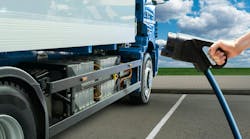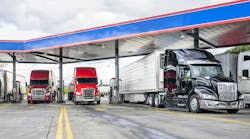With easily the country's largest private fleet, it's hard to ignore the path AT&T has embarked on as it switches close to 20% of its fleet over to alternative fuel vehicles over the next nine years. The company, which has over 78,000 total power units according to the 2010 Fleet Owner 500 listings of the top private fleet operations in the U.S., started a $565 million journey last March with the announcement it was switching over 15,000 vehicles in its fleet to alternative fuel by 2019.
“We think we have a very comprehensive approach to sustainability,” says Jerome Webber, vp-fleet operations. “As we put this fleet on the road every day, we know there is a responsibility that comes with that.”
AT&T has already started the switch of over 8,000 vehicles, primarily Ford E-250 Econoline gasoline-powered vans, to run on compressed natural gas (CNG). BAF Technologies is working on the conversion for the company. Most of the vehicles are replacing current equipment, Webber says, but “in some cases, it's for growth as well.” What's important to the fleet operations, though, is that this conversion will actually take place over five years. Total cost for the vans alone will be about $350 million. The rest of the money will fund the purchase of hybrid-electric cars, including Ford Escapes, Ford Fusions, Toyota Prius and full-size Ford E-450 box trucks.
The big change at the moment is the switch to CNG fuel for its vans. “Compressed natural gas is a technology that is here today,” Webber says. “We call it a ‘now’ technology. It's here today; we can take advantage of it today. And the other factor is 90% of compressed natural gas is here in this country.”
And that is a big point for AT&T as it seeks to reduce its dependence on imported fuel. While Webber admits CNG is not the end all and be all, it is a great technology in many cases and costs 30-40% less than diesel or regular gas, he says. “There is no silver bullet for us,” Webber adds. “It's going to take a mixed fleet for us. Our strategy is to stay very nimble and look for the right fit.”
The announcement of the conversion, back in March 2009, set the tone, but Webber says it provides a blueprint of sorts for others to follow. “To our surprise, it ended up being the largest corporate commitment to compressed natural gas … and that's paved the way for a lot of other fleets,” he says.
The CNG vans provide other benefits as well. According to the Center for Automotive Research, AT&T's plans will save or create 1,000 jobs for manufacturers and suppliers associated with the purchase each year for five years. In addition, when combined with the conversion of the car fleet, a total reduction of 211,193 metric tons of CO2 over ten years will be realized, with 148,444 tons from the CNG vehicles alone. AT&T will also save 49.3 million gals. of fuel over the ten years.
But these savings depend on CNG infrastructure, something that is not fully developed in this country as of yet. Webber says when deploying the vehicles, the company is looking to see where CNG facilities already exist. As part of that March 2009 announcement, Randall Stephenson, chairman & CEO, said AT&T was committed to building up to 40 fueling stations as part of the project.
Webber says that is still possible. “We're hoping we can get others to understand we need to build the infrastructure,” he explains. “We are currently looking at a couple of our facilities where we would build [stations] and open them to the public.”
While CNG vehicles will represent the largest portion of the alternative-fuel fleet, the company is also looking at other options, including the testing of a Smith Newton all-electric van. “We're doing some testing of that vehicle to see how it performs and meets our needs before we make any additional purchases,” Webber says.


